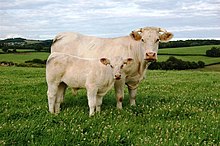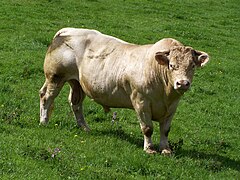You can help expand this article with text translated from the corresponding article in French. (May 2015) Click [show] for important translation instructions.
|
 Cow and calf | |
| Conservation status | FAO (2007): not at risk[1]: 144 |
|---|---|
| Other names | French: Charolaise |
| Country of origin | France |
| Distribution | Worldwide |
| Use | Beef |
| Traits | |
| Weight | |
| Height |
|
| Coat | White [2] |
| Horn status | Horned in both sexes[3] |
| |
The Charolais (French: [ʃaʁɔlɛ]) or Charolaise ([ʃaʁɔlɛz]) is a French breed of taurine beef cattle. It originates in, and is named for, the Charolais area surrounding Charolles,[4] in the Saône-et-Loire department, in the Bourgogne-Franche-Comté region of eastern France.
Charolais are raised for meat; they may be crossed with other breeds, including Angus and Hereford cattle.
History
The Charolais is the second-most numerous cattle breed in France after the Holstein Friesian and is the most common beef breed in that country, ahead of the Limousin. At the end of 2014, France had 4.22 million head of Charolais, including 1.56 million cows, down 0.6% from a year earlier.[5]
The Charolais is a world breed: it is reported to DAD-IS by 68 countries, of which 37 report population data. The world population is estimated at 730,000. The largest populations are reported from the Czech Republic and Mexico.[6]
The breed was introduced to the southern United States from Mexico in 1934.[7]
As the cradle of the Charolais cattle,[8] the Charolais-Brionnais Country is applicant for the UNESCO's label as a World Heritage Site to preserve, consolidate and transmit this resource.[9]
Characteristics
It is among the heaviest of cattle breeds: bulls weigh from 1000 to 1650 kg (2200 to 3600 lb), and cows from 700 to 1200 kg (1500 to 2600 lb). The coat ranges from white to cream-colored; the nose is uniformly pink.[2]: 153
The Charbray, a cross-breed with Brahman cattle, is recognized as a breed in some countries.[10] The Brazilian Chicana is a composite breed with 5/8 Charolais and 3/8 Indu-Brasil.[11] Other derived breeds include Charford and Char-Swiss in the United States.[2]: 153
-
Bull at the Salon international de l'agriculture in 2011
-
Bull in the Morvan
-
Feral bull in Sierra Nevada de Mérida, Venezuela
-
Cows at pasture in Burgundy
-
Embryo-transferred calves with their Aberdeen Angus and Hereford recipient dams
See also
References
- ^ Barbara Rischkowsky, D. Pilling (eds.) (2007). List of breeds documented in the Global Databank for Animal Genetic Resources, annex to The State of the World's Animal Genetic Resources for Food and Agriculture. Rome: Food and Agriculture Organization of the United Nations. ISBN 9789251057629. Accessed September 2019.
- ^ a b c d e Valerie Porter, Lawrence Alderson, Stephen J.G. Hall, D. Phillip Sponenberg (2016). Mason's World Encyclopedia of Livestock Breeds and Breeding (sixth edition). Wallingford: CABI. ISBN 9781780647944.
- ^ Charolaise / France (Cattle). Domestic Animal Diversity Information System of the Food and Agriculture Organization of the United Nations. Accessed April 2020.
- ^ "Breeds of Livestock - Charolais Cattle — Breeds of Livestock, Department of Animal Science". afs.okstate.edu. Retrieved 25 February 2020.
- ^ [1] Infos rapides Bovins : Hausse du cheptel bovin français en 2014. Accessed June 2015.
- ^ Transboundary breed: Charolais. Domestic Animal Diversity Information System of the Food and Agriculture Organization of the United Nations. Accessed May 2015.
- ^ The Charolais heritage ... a brief history Archived 19 April 2014 at the Wayback Machine. American-International Charolais Association. Accessed May 2015.
- ^ "Histoire du Charolais - La Maison du Charolais". www.maison-charolais.com. Archived from the original on 25 November 2013.
- ^ "Notre candidature - Pays Charolais-brionnais". Archived from the original on 15 December 2019. Retrieved 23 December 2019.
- ^ Transboundary breed: Charbray. Domestic Animal Diversity Information System of the Food and Agriculture Organization of the United Nations. Accessed May 2015.
- ^ Breed data sheet: Canchim / Brazil (Cattle). Domestic Animal Diversity Information System of the Food and Agriculture Organization of the United Nations. Accessed September 2019.













